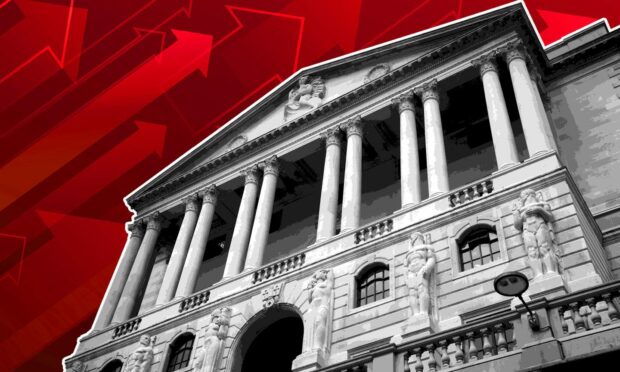The Bank of England (BoE) has raised its base interest rate to 1% but what does this mean for mortgages, savings and investments, asks Keith Findlay.
The UK’s benchmark bank rate increased from 0.75% to 1% last week, in line with market expectations, with monetary policymakers looking to curb rampant inflation.
It is the fourth monthly rise in a row and takes the base rate to the highest level since February 2009.
According to north-east personal finance expert Paul Gibson, of Banchory-based Granite Financial Planning, the latest increase will impact everyone.
Mortgages
Mr Gibson said: “Those who are not on fixed mortgage rates will already have heard from their lender that payments are going up.
“Mortgage rates are still at historic lows but if you are on the standard variable rate, it is worth speaking with a mortgage specialist to check your deal.”
Alice Haine, personal finance analyst at investing platform Bestinvest, said “While mortgage rates will rise, the cost of borrowing is still historically low – so there’s no need to go into full panic mode yet.
“With interest rates still very much on the low side, the increase in percentage terms is modest.
“This might not have been an issue in a normal economic climate, but in the current cost-of-living crisis every pound matters as households struggle to balance the books.”
Ms Haine added: “The good news is it won’t affect every mortgage-holder straight away.
“For those on fixed-rate mortgages, an increase in the rate only makes a difference when their term comes to an end.
“For now, they can rest easy knowing their monthly payments will not go up – yet.”
She continued: “For those on tracker mortgages, where the home loan tracks the BoE base rate, the news is less positive as the base rate increase will be passed on to borrowers in full – delivering an immediate financial blow.
“For those on variable rates, now could be a good time to lock in a fixed-rate deal as interest rates are expected to increase further over the coming months, potentially hitting 3% by the end of the year.”
Savings
Savers should see an increase in the interest rate they receive, Mr Gibson said.
But he added: “This may not always be for the full increase in rates and might seem to be applied more slowly.
“Whilst an increase for savings is welcomed, the effect of inflation is the ‘real’ return is negative.”
Ms Haine said: “For savers, an interest rate rise can only be a good thing, but they may need to be patient.
“Savings rates will tick up very slowly and very gradually in the coming weeks and months.
“Banks and building societies can sometimes take their time to pass on the uplift.”
Annuities
Helen Morrissey, senior pensions and retirement analyst at Hargreaves Lansdown, said annuities could be about to “step back into the spotlight”.
Ms Morrisey added: “After languishing in the doldrums for some time, annuity incomes have risen markedly – in part helped by recent interest rate increases – and we should see this upward momentum continue.”
An annuity gives you a regular guaranteed income in retirement, either for life or for an agreed number of years.
Other investments
Mr Gibson said: “Investment markets are volatile but the reason for investing is to try and ensure the spending power of our capital is maintained in the long run.
“The long-term returns from global equities have delivered real returns far in excess of cash deposits and inflation, so staying invested and not panicking is invariably the right course of action.”
- Virgin Money stands by its remaining branches – as long as people use them
- Sausage roll-onomics reveal how long it takes to earn your savoury snack
Bestinvest managing director Jason Hollands said: “The truth is we are only in the foothills of this cycle.
“Rising borrowing costs have implications for the way investors assess businesses and in this respect, ‘growth’ companies in sectors like technology and communication services are particularly vulnerable.
“When rising borrowing costs and inflation create greater uncertainty about the future value of money, investors revise their view of what such companies should be valued at.”




Conversation